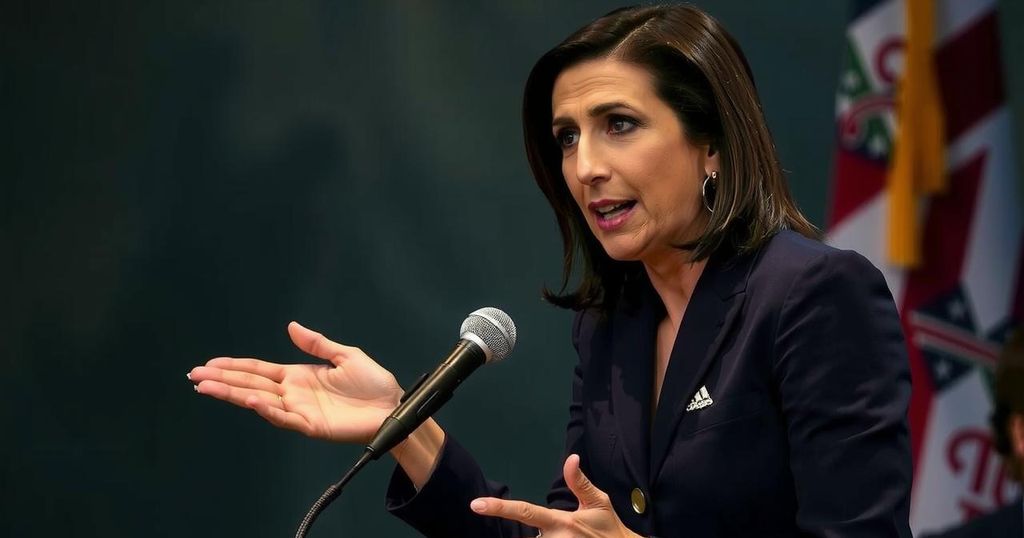Tulsi Gabbard Under Scrutiny Following Spy Agency Nomination
Tulsi Gabbard’s selection as Trump’s nominee for Director of National Intelligence has raised concerns regarding her controversial history, including a meeting with Assad and her positions on Russia. Critics argue that her views may undermine U.S. intelligence cooperation with allies. While some lawmakers express skepticism, others support her candidacy, indicating a polarized response as her confirmation process looms.
Former Congresswoman Tulsi Gabbard faces renewed scrutiny following her selection by President-elect Donald Trump as the nominee for Director of National Intelligence (DNI). Critics are concerned about her controversial past, including a 2017 meeting with Syrian President Bashar al-Assad and her statements regarding Russia’s actions in Ukraine. If confirmed, Gabbard would oversee the nation’s intelligence agencies and provide counsel to the president, roles in which her anti-war stance and critiques of U.S. foreign policy may raise questions among allies about intelligence-sharing.
Prominent former national security officials argue that Gabbard’s appointment could jeopardize U.S. collaboration with international intelligence partners due to her past positions perceived as aligned with Russian narratives. Gabbard, who recently switched to the Republican Party, defends her views as part of a necessary critique against so-called warmongers in U.S. politics. Trump has expressed confidence that Gabbard’s military background will add value to the intelligence community, although her selection received unusual acclaim from Russian media, heightening concerns among American security officials.
Gabbard’s history of criticism towards U.S. interventions and her encounter with Assad during a fact-finding mission have defined her political trajectory and stirred controversy during her 2019 presidential campaign. Most notably, she questioned U.S. intelligence claims regarding Assad’s chemical weapon usage, a position that continues to draw ire from many quarters. As the debates surrounding her candidacy intensify, Gabbard’s critics worry that her worldview could undermine intelligence relations with foreign partners. Nonetheless, not all officials are apprehensive, with some asserting that longstanding security alliances will remain stable regardless of individual appointments.
As Gabbard’s nomination approaches potential Senate confirmation, lawmakers from both parties emphasize the importance of aligning U.S. foreign policy practices and intelligence perspectives. Her nomination is expected to elicit substantial inquiry regarding her past statements and their implications for U.S. intelligence diplomacy. While skepticism persists, some Republicans express enthusiasm about Gabbard’s potential, highlighting a complex dynamic within her confirmation process.
The article addresses the implications of Tulsi Gabbard’s potential nomination as the Director of National Intelligence by President-elect Donald Trump. It highlights her controversial political history characterized by anti-war sentiments and criticism of U.S. foreign interventions, notably concerning Syria and Russia. The subsequent scrutiny from former national security officials and lawmakers delineates the tension between her views and traditional U.S. foreign policy. This scrutiny also reflects broader geopolitical concerns about trust and cooperation in intelligence-sharing among allied nations, particularly following Gabbard’s previous associations and statements on sensitive issues.
In conclusion, Tulsi Gabbard’s appointment as Director of National Intelligence poses significant challenges amid concerns over her previous foreign policy positions, particularly regarding Syria and Russia. As she faces the Senate confirmation process, lawmakers will critically assess her qualifications and potential impact on U.S. intelligence relations abroad. The contrasting opinions among foreign allies and U.S. officials signal a contentious dialogue surrounding her nomination, emphasizing the complexities inherent in global intelligence diplomacy during Trump’s administration.
Original Source: www.bbc.com




Post Comment